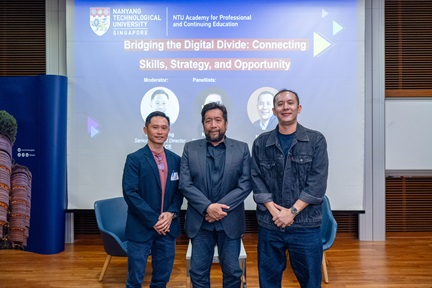Navigating Industry Jumps: A Guide to Successful Career Pivots

The cliche idea of holding jobs for years seems like a thing of the past - at least it does allusively. According to a 2023 Blackbox-ADNA career study, when asked about career sentiments, 64% of the 9,000 Southeast Asian respondents believe mapping out a career path is harder today than it was ten years ago.
These findings underscore the growing realisation that adaptability and flexibility are paramount for job security in a rapidly changing job market. Embracing upskilling and reskilling has become a proactive approach to not only secure employment but also to explore exciting avenues for career growth. Here is a 3-step guide to achieving a successful career pivot.
1. Recognising the Need for Change
The consequences of not pivoting in a career when things are not ideal can be detrimental. Wasted years can fly by as individuals feel trapped in an unfulfilling role, for example, displaced skill sets or dissatisfaction from a lack of challenges. Here is the truth: many choose to stay wherever they are despite work discontentment because they do not believe they have the power to change their situation when in reality, they do. If you find your current role unfulfilling, it might signal that you are ready for a career pivot.
Understandably, there are a million fears and uncertainties tied to career pivots. Some of these fears include external opinions, feeling too old for change, losing past and present experiences, or dreading the unknown. Put your fears into perspective, evaluate them, and you might discover that the worst-case scenario is both unlikely and manageable.
2. Networking and Building Connections
Building a network can be just as crucial as your expertise when pursuing professional opportunities. Research suggests that employee referrals can boost your chances of landing a job by 2.6% to 6.6%. To leverage your networking connections to your advantage, LinkedIn has proven to be a formidable weapon in your job-hunting toolkit, with 87% of recruiters relying on the platform to discover potential job candidates. Connect with the people of the companies you wish to work for - recruiters, hiring managers, or even roles similar to the ones you seek.
In addition, leverage the personal connections that you have made over the years of working in the industry and reach out to them. Keep a lookout for job fairs - leverage your communication skills and sell yourself to future company prospects, whether that would be in-person or virtually.
3. Developing New Skills
Now to the exciting bit — identifying and cultivating relevant skills to transfer to your new job. Contrary to what many might think, skills are not specific to a single role but are instead transferable. It can be adapted in-between jobs, and continuing education is a valuable resource for enhancing these skill sets.
Participating in continuing education yields immediate benefits such as increased job security, heightened confidence, and substantial professional and personal growth. Enhanced knowledge acquired through continuing education often results in increased responsibilities within a role, which can be associated with improved compensation. Engaging in these opportunities can also empower emerging professionals to construct a robust network and position themselves as thought leaders in their domain.
Embracing Your Mid-Career Shift With NTU
Here at Nanyang Technological University, Singapore (NTU), our commitment to lifelong learning is exemplified by the Centre for Professional and Continuing Education, PaCE@NTU, a central hub for NTU's continuing education initiatives that stands as more than a conventional institution of higher learning. By offering short courses to postgraduate programmes, PaCE@NTU aims to equip potential learners with cutting-edge knowledge and skills to keep pace with the rapid technological changes in an increasingly competitive economy and industrial landscape.
Teaming up with NTU’s esteemed educational institutions, industry leaders, and research hubs, we have a dynamic range of courses to allow learners to sculpt their journey and plan a successful career pivot. There are a multitude of pathways to explore —from over 50 FlexiMasters for upskilling, employability, and intellectual growth, or 400 over short courses aligned with SkillsFuture Singapore and Industry Transformation Maps (ITMs) for personal and career growth. For those considering a career switch, our industry-focused curriculums through the SkillsFuture Career Transition Programme (SCTP) provide personalised career consultation services for career switches.
In the world of career pivoting, success stories can help to illuminate the path for those seeking new directions. Odelia Tan, Business Intelligence Application Developer at Elixir Technology, had a strong background in banking and finance. After realising her passion for creating innovative software solutions, she pursued the SkillsFuture Career Transition Programme in Software Engineering offered by PaCE@NTU. The programme offered her a structured path to transition into a new career, and combined her financial expertise with software development. Today, she has successfully transitioned to software engineering.
Taking the Leap
In the vibrant and fast-evolving market of Singapore, career transitions should be embraced as a part of life. It can be a remarkable journey of self-discovery and growth, a step toward new horizons and uncharted territories where your skills and potential can flourish. Contact us today for career consultation services that can assist you in navigating your career pivot.






